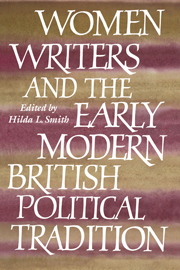Book contents
- Frontmatter
- Contents
- List of contributors
- Preface
- Introduction: Women, intellect, and politics: their intersection in seventeenth-century England
- Part I Women's political writings, 1400–1690
- Introduction to Part I
- 1 Christine de Pizan and the origins of peace theory
- 2 Political thought/political action: Margaret Cavendish's Hobbesian dilemma
- 3 Women's public political voice in England: 1640–1740
- 4 Contextualizing Aphra Behn: plays, politics, and party, 1679–1689
- Part II Women's political and philosophical writings, 1690–1800
- Part III The intellectual context and economic setting for early modern women
- Part IV Early modern legal and political prescriptions for women
- Conclusion: women's writing, women's standing: theory and politics in the early modern period
- Index
4 - Contextualizing Aphra Behn: plays, politics, and party, 1679–1689
from Part I - Women's political writings, 1400–1690
Published online by Cambridge University Press: 04 August 2010
- Frontmatter
- Contents
- List of contributors
- Preface
- Introduction: Women, intellect, and politics: their intersection in seventeenth-century England
- Part I Women's political writings, 1400–1690
- Introduction to Part I
- 1 Christine de Pizan and the origins of peace theory
- 2 Political thought/political action: Margaret Cavendish's Hobbesian dilemma
- 3 Women's public political voice in England: 1640–1740
- 4 Contextualizing Aphra Behn: plays, politics, and party, 1679–1689
- Part II Women's political and philosophical writings, 1690–1800
- Part III The intellectual context and economic setting for early modern women
- Part IV Early modern legal and political prescriptions for women
- Conclusion: women's writing, women's standing: theory and politics in the early modern period
- Index
Summary
The recent explosion of interest in the seventeenth-century English playwright, novelist, and poet, Aphra Behn, has led to numerous and diverse explorations of her life and work. Behn's colorful if often mysterious life has been the subject of five biographies and the stuff of at least two novels. She has been celebrated as one of the most prolific and popular playwrights of the Restoration and an early practitioner of the novel. Scholars have portrayed her as a thorough-going feminist, a libertine and an opponent of the domestic tyranny of patriarchy, and an abolitionist, writing one of the first anti-slavery novels in Western literature.
Despite the recent avalanche of scholarship, little has been written about Behn as a political writer. This is a rather curious omission for several reasons. Scholars have long recognized the highly politicized nature of the theater in the 1680s. Studies of the politics and ideology of male dramatists, particularly John Dryden, abound. Behn, like her male competitors Dryden, Shadwell, Settle, Crown and others, also produced highly political stage plays, bursting with topical references, mired in the controversies of the time. Yet beyond the blanket assertion that Behn was a Tory propagandist, little analysis of her political vision exists. This is particularly surprising for a rare female voice in the loud political cacophony of the 1680s.
- Type
- Chapter
- Information
- Publisher: Cambridge University PressPrint publication year: 1998
- 5
- Cited by



